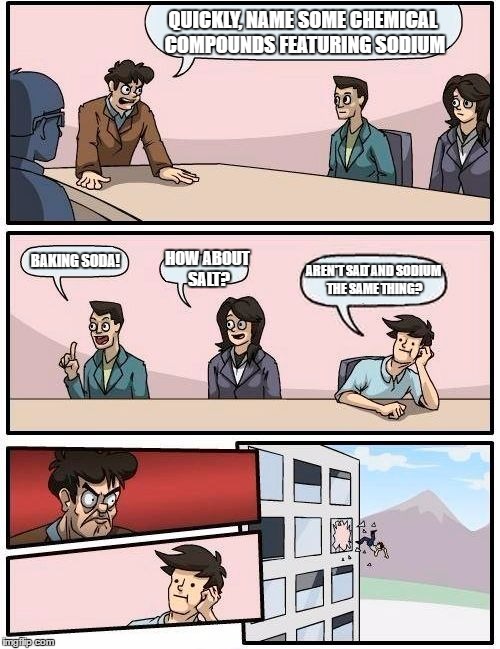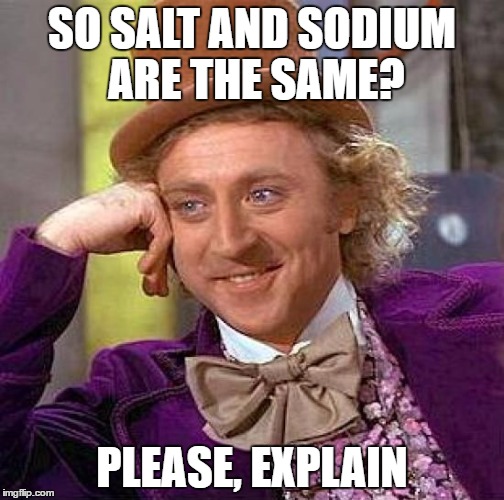Why Sodium is the Best Element
By: Connor Sunderland
 Sodium, you see it almost everywhere, but, why would it be the best element? Well, let me give you a brief description about it just so you know more. Sodium is the 11th element of the periodic table, and has 11 protons, and 11 electrons as shown in the Bohr-Rutherford Diagram to the left. Also, it's symbol is Na. A single atom of sodium has also has 12 neutrons, as well as a mass of 22.990. It's ion only has 10 electrons and it gains a charge of 1+, when it loses it's valence electron. As an alkali metal, it is incredibly reactive and at it's most reactive when paired with a halogen. Despite being the sixth most abundant element on Earth, and 2.6% of the Earth's crust, it was only discovered in 1807 when the English chemist Sir Humphrey Davy found a way to separate it from it's compounds. Up until that point, sodium was only found as part of a compound, such as salt. It's symbol Na, comes from the Latin name of sodium carbonate, natrium.
Sodium, you see it almost everywhere, but, why would it be the best element? Well, let me give you a brief description about it just so you know more. Sodium is the 11th element of the periodic table, and has 11 protons, and 11 electrons as shown in the Bohr-Rutherford Diagram to the left. Also, it's symbol is Na. A single atom of sodium has also has 12 neutrons, as well as a mass of 22.990. It's ion only has 10 electrons and it gains a charge of 1+, when it loses it's valence electron. As an alkali metal, it is incredibly reactive and at it's most reactive when paired with a halogen. Despite being the sixth most abundant element on Earth, and 2.6% of the Earth's crust, it was only discovered in 1807 when the English chemist Sir Humphrey Davy found a way to separate it from it's compounds. Up until that point, sodium was only found as part of a compound, such as salt. It's symbol Na, comes from the Latin name of sodium carbonate, natrium. .jpg/220px-Na_(Sodium).jpg) |
| Pure sodium |
Physical Properties
Sodium, in it's pure form is a silvery or whitish, shiny metal that melts at 97.79℃ and it's boiling point is 882.8℃. It is soft and has a cubic crystal structure. It is malleable as well as ductile. It is also a good conductor of electricity.Chemical Properties
Sodium is a very reactive substance, and it reacts explosively with water. It s flammable and when set on fire the fire is a golden-yellow flame.Why Sodium is the Best

Now, you're probably thinking "What makes sodium so special?". Well, as I've said, sodium is highly reactive, and that is it's most valuable quality. Sodium has many potential compounds and the salt is not the only one, in fact, despite popular belief, salt and sodium are NOT the same thing. In fact, salt is a chemical compound called sodium chloride, also known as NaCl. This is just one of sodium's many compounds that we use in our daily life. One of it's compounds is sodium bicarbonate, also known as baking soda or NaHCO3. Baking soda is commonly used for cooking, cleaning, whitening of teeth, and it's use as a household utility item was popularized by the brand "Arm & Hammer". Other uses of baking soda include as a heartburn remedy and a cure for indigestion.The most famous compound of sodium is obviously salt. Now the many uses of salt are immeasurable, and salt is found almost everywhere. The many benefits and uses of salt include adding flavour to our food, keeping our blood at a reasonable thickness, and helping Windsor's economy (There are salt mines underneath Windsor). Now, not only compounds featuring sodium are used for helpful purposes. The most common use is the use of sodium vapour in some types of street lights, because it gives off a yellow light. Liquid sodium is used as a coolant in nuclear reactors. Some other compounds of sodium include sodium carbonate (Na2CO3), a compound used in sewage treatment systems, and borax (Na2B4O7·10H2O), a compound used for boosting the effects of your laundry detergent, as well as sodium diuranate (Na2U2O7), a glaze sed for giving ceramics a yellow-orange colour. Finally, sodium isn't only used for all these, it's essential to be consumed, given that is easily used as a substance that controls water levels in pretty much anything, especially our bodies. That's why you see so many athletes drink substances like Gatorade after a game. The sodium in the Gatorade helps your body retain the water so you don't get too dehydrated. These are some of, but not all of the reasons why sodium is the best element on the Periodic Table.
| Baking soda |
 |
| Sodium diuranate |
References
"Sodium (Na)." Encyclopedia Britannica Online. Encyclopedia Britannica, n.d. Web. 12 Dec. 2016.
"SODIUM." Sodium, Chemical Element - Reaction, Water, Uses, Elements, Examples, Metal, Gas, Number. N.p., n.d. Web. 12 Dec. 2016.
Images found on Google.
"Meme Generator." Meme Generator - Imgflip. N.p., n.d. Web. 12 Dec. 2016.
Gagnon, Steve. "The Element Sodium." It's Elemental - The Element Sodium. N.p., n.d. Web. 12 Dec. 2016.

Great job Connor! Your blog is very informative on sodium. (particularly how it's not salt)
ReplyDelete